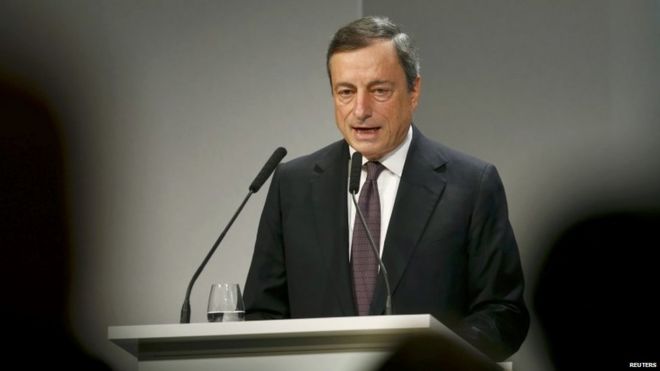The European Central Bank (ECB) has moved to bolster the eurozone economic recovery by cutting a key interest rate and extending its stimulus programme.

The overnight deposit rate was cut from -0.2% to -0.3%, to push banks to lend instead of parking money at the ECB.
The ECB also extended its monthly €60bn stimulus programme by six months to March 2017, but left its main interest rate on hold at a record low of 0.05%.
Many analysts were underwhelmed by the news and had forecast tougher measures.
ECB president Mario Draghi told a news conference that its bond-buying stimulus programme, or quantitative easing (QE), was working.
But an extension of QE was needed to tackle prolonged low inflation and get it back towards the ECB's 2% target, he said. QE would now run to at least March 2017, from
'Tinkering'
The cut in the interest rate on overnight bank deposits means that banks in effect pay more to the ECB for holding their reserves.
The policy is designed to make it more profitable for banks to offer loans to consumers and businesses, ensuring a free flow of money.
However, most analysts had been expecting the ECB to take more drastic action.
"Draghi has over promised and under delivered," said Patrick O'Donnell, investment manager at Aberdeen Asset Management.
"Everyone was expecting Draghi to be the white knight for Europe once again and he hasn't really showed up. Today's measures amount to tinkering around the edges." He added: "Markets won't be particularly impressed."
The main stock markets in Germany and France, which had been rising, turned negative soon after the ECB's announcement. Frankfurt's Dax was down 2.5%, while France's Cac index was 1.96% lower.
Ahead of the announcement, the euro had been weakening. However, when the measures fell short of expectations the euro surged against the dollar, rising more than two cents to above $1.08.
Oil effect
The ECB is tackling low inflation, currently 0.1% and a potential obstacle to stronger growth.
Mr Draghi told the news conference that eurozone inflation for 2016 is expected to reach 1% rather than the 1.1% previously forecast. For 2017, inflation is set to reach 1.6%, down from the previous prediction of 1.7%.
Inflation in the eurozone has been below zero - that is, prices were falling - as recently as September. This has been because of falls in international energy prices, particularly crude oil.
But "core inflation", which strips out volatile food and energy prices, is also low, hovering persistently around 1%.
The latest figure, for November, was down on the previous month.
Analysis: Andrew Walker, economics correspondent
The ECB has "under-delivered" to quote one economist. It's quite a widely shared view.
Perhaps the most telling verdict is from the currency markets. The euro is now stronger. Why? Because the stronger medicine that was expected would have tended to drive down interest rates in eurozone markets even further making it more lucrative to buy assets in other currencies instead.
Two things have disappointed the markets. They were looking for a commitment to increase the amount the ECB and national central banks spend each month on QE.
Instead, Mr Draghi said it would go on longer but at the same monthly rate. And the markets expected a bigger cut in the interest rate on banks' deposits at the ECB. It's already below zero which means the banks are being charged to park excess funds at the central bank.
A bigger cut would have given them an even bigger incentive to lend more rather than sit on idle cash.
No comments:
Post a Comment